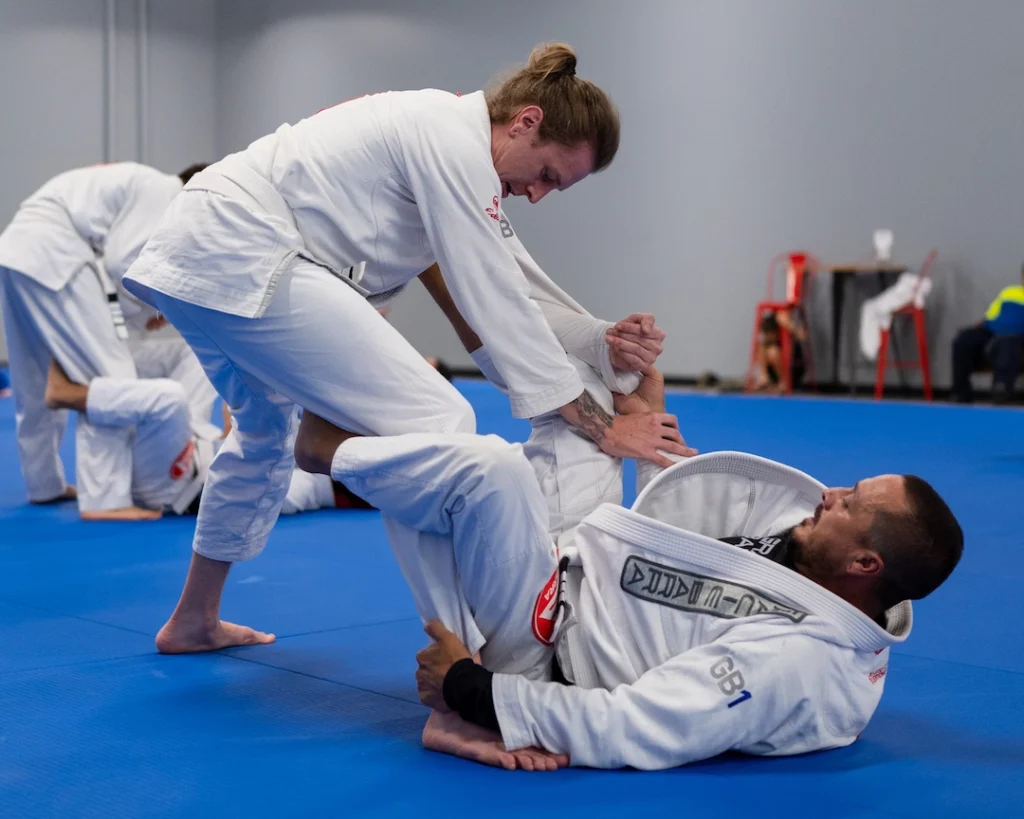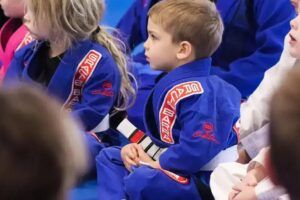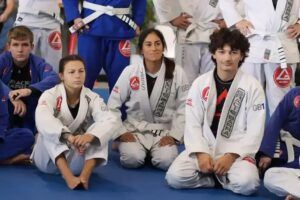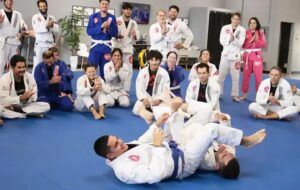This is Professor Seidler Rodrigo Ziser, a 2nd-degree Brazilian Jiu-Jitsu Black belt teaching and helping families here in Utah and I’d like to bring some questions to you:
When was the last time you allowed yourself to be a beginner at something?
Do you still remember the excitement of discovering new things, learning from scratch, and enjoying the process?
That’s exactly what it feels like to be a white belt in Jiu-Jitsu. It’s the most crucial phase of your journey, where there’s no pressure to perform perfectly, and the focus is on growth and exploration.
Progress often comes quickly and in big leaps because you’re starting from zero. Weight loss, improved physical fitness, and overall well-being are some of the first benefits you’ll notice. Let’s take a closer look and share some tips to help you navigate and enjoy your white belt journey to the fullest!
Setting Goals in Jiu Jitsu
New students commonly walk into class with a long list of expectations and goals, but they often don’t align with what the professor truly values. Professors prioritize behavior goals over outcome goals. They’re not concerned with how perfect your armbar is or how quickly you can execute a takedown. Instead, they focus on the habits and mindset that will set you up for long-term success. Here’s what I expect from a white belt:
-
Attendance in Jiu Jitsu classes
Without showing up, nothing else matters. How can you develop skills, lose weight, make friends, or build confidence if you’re not there? Commit to attending class, especially on days when you don’t feel like it—when the weather is bad, when you’re tired, or when excuses creep in. The first step is always just showing up.
-
Consistency in Training
Attending class every day for one week and then disappearing for two weeks won’t help you progress. Consistency is key. Without it, you’ll forget what you’ve learned and struggle to build on foundational skills. Lack of consistency often results in students being stuck at the white belt level for longer than necessary. If you’ve been a white belt for two years, check your attendance—you’ll likely see why progress has stalled.
-
Trust Your Jiu Jitsu Journey
Your professor has a proven system, honed through years of experience and by helping countless students achieve their goals. Trust the methods, follow the curriculum, and listen to the advice given to you. Avoid shortcuts—there aren’t any in Jiu-Jitsu. Focus on what you learn in class, ask questions, and be open to feedback.
-
Take Care of Your Health
Your body is your primary tool in Jiu-Jitsu, so take care of it. Eat healthy, get adequate sleep, stretch, and incorporate additional workouts if needed. Investing in your physical health will pay off in your training and overall progress.
-
Set Realistic Goals for Your Jiu-Jitsu Journey
Don’t expect to dominate a purple belt or master every technique overnight. Instead, focus on learning and approaching training with a growth mindset. Be patient with yourself and prioritize understanding over performance.
-
Breathe, Relax, and Control Your Strength
This is one of the biggest challenges for newcomers at Jiu Jitsu. Avoid tensing your entire body and using brute strength. Stay calm, breathe deeply, and conserve your energy. This will allow you to think clearly, feel what your training partner is doing, and respond effectively. Learning to relax is essential for improving your technique and awareness.
By focusing on these principles, you’ll set yourself up for a rewarding journey in Jiu-Jitsu, building both skills and character along the way.
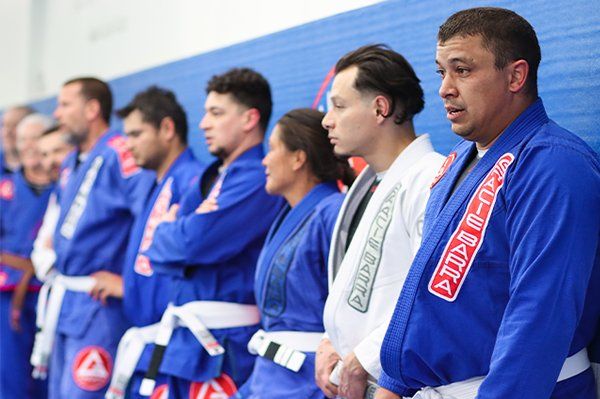
What should a white belt focus on during Jiu Jitsu training?
As a white belt, the focus should be on developing habits and skills that build a solid foundation for the rest of your Jiu-Jitsu journey. While it’s tempting to try flashy moves or aim for submissions, the key is to concentrate on fundamentals that will serve you well in every phase of your progress. Here’s a breakdown of what you should prioritize during training:
Repetition
Mastery comes from repetition. Focus on drilling techniques over and over again. The more you repeat a movement, the more natural it will feel, and the more effective it will become. Don’t rush through drills—aim for precision and attention to detail. Consistent repetition builds muscle memory, so when the time comes to execute the move in live training, it’ll feel instinctive.
Defenses
As a white belt, you’ll often find yourself on the defensive. Embrace this as an opportunity to learn. Focus on protecting yourself and escaping bad positions rather than trying to force attacks. Mastering defenses will not only help you survive but also build your confidence as you learn to stay calm under pressure. Remember: a strong defense is the foundation of a solid Jiu-Jitsu game.
Controlling
Instead of focusing solely on submissions, work on controlling your opponent. Learning how to establish and maintain positions like side control, mount, and back control is far more important in the early stages. Controlling your opponent shows that you can dominate the situation without rushing to finish the fight. Once you have control, submissions will come naturally as you progress.
Finding Comfort in Bad Spots
One of the biggest challenges for white belts is staying calm when they’re stuck in bad positions. Whether it’s being mounted, stuck in side control, or caught in a submission attempt, learning to relax and breathe is crucial. Don’t panic—use these moments to practice patience and composure. Finding comfort in uncomfortable situations will make you resilient and prepare you for tougher opponents as you advance.
Common White Belt Mistakes in Jiu Jitsu
Using Too Much Strength
White belts often rely on brute force rather than technique. While strength might help initially, it’s inefficient and unsustainable. Instead, focus on learning proper mechanics and leverage to conserve energy and execute techniques effectively.
Holding the Breath
Many beginners unknowingly hold their breath during training, especially in stressful situations. This leads to faster fatigue and poor decision-making. Practice breathing calmly and consistently, even under pressure.
Overthinking Jiu Jitsu Techniques
Instead of flowing with the movements, white belts tend to overanalyze every step, slowing down their progress. Trust the process, follow your instructor’s guidance, and allow your body to learn through repetition.
Skipping Jiu Jitsu Fundamentals
Flashy submissions and advanced moves can be tempting, but skipping the basics will hurt your long-term development. Master fundamental positions, escapes, and controls before moving on to complex techniques.
Lack of Defense Focus
Many beginners focus solely on attacking and forget the importance of defense. Building strong defensive skills will help you survive and gain confidence, allowing you to progress without unnecessary frustration.
Spazzing
Uncontrolled, frantic movements (spazzing) not only put you at risk of injury but also make you an unpredictable and unsafe training partner. Slow down, stay mindful, and prioritize control over chaos.
Comparing Yourself to Others
Every student progresses at their own pace. Comparing yourself to more experienced teammates or fellow white belts can lead to unnecessary frustration. Focus on your own journey and celebrate small victories.
Neglecting Positional Training
White belts often chase submissions without establishing proper control. Spend time learning how to secure and maintain dominant positions before worrying about finishes. Position before submission is a golden rule.
Not Asking Questions
Some beginners are hesitant to ask questions, fearing they’ll seem inexperienced. Remember, your instructors and teammates are there to help. Asking for clarification or advice shows commitment to learning.
Inconsistent Attendance
Sporadic training slows progress and makes it harder to retain what you’ve learned. Consistency is the foundation of improvement in Jiu-Jitsu. Commit to regular attendance and make training a habit.
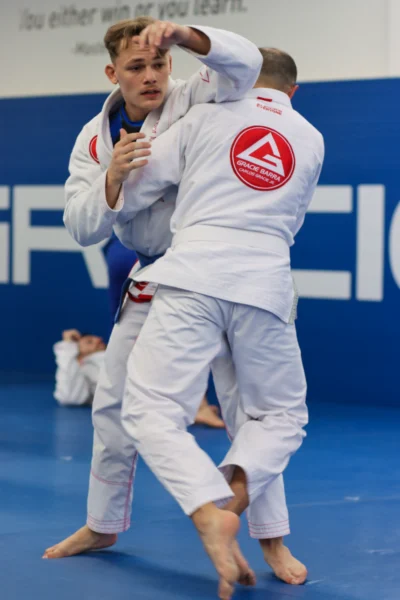
How to Accelerate Your BJJ Progression for Jiu Jitsu Beginners
On top of everything we’ve discussed, there’s one crucial aspect that deserves special attention: patience. Let time do its job, and don’t rush the process. Remember, you’re a beginner, not a professional athlete.
One common misconception is that learning and performance progress in a straight, linear path—but that’s rarely the case. Progress often comes in waves or jumps, and it’s normal to feel like you’re stuck at times. However, this doesn’t mean you’re not improving.
I like to use the example of boiling water to illustrate this point. Water boils at 212°F. Until it reaches that temperature, it may not look like much is happening. At 200°F, it’s not boiling yet, but it’s far from cold—it’s on its way. Sometimes, you just need a little more time and energy to reach that next phase.
So, if you feel like you’re not progressing, don’t get discouraged. Stay consistent, keep putting in the effort, and trust that the work you’re doing is building up, even if the results aren’t immediately visible. Progress in Jiu-Jitsu takes time, but the payoff is worth it.
When selecting a BJJ school, the choice is pivotal for building a robust foundation in Brazilian Jiu-Jitsu. Gracie Barra Utah’s schools, namely Gracie Barra Salt Lake City, Gracie Barra Riverton, and Gracie Barra West Jordan, are standout options. With a family-friendly atmosphere, certified instructors, and a methodology perfected over 30 years by Master Carlos Gracie Jr., these schools create the ideal environment for your success in BJJ.
Frequently Asked Questions about Jiu Jitsu for Beginners
How Often Should a White Belt Train in Brazilian Jiu Jitsu?
To make optimal progress in BJJ, as a white belt, it’s important to find a training frequency that balances your commitments. Avoid burnout by adjusting training intensity and listening to your body. 2-3 times a week is enough for most students.
Are There Any Age Restrictions for Starting Brazilian Jiu Jitsu as a White Belt?
There are no age restrictions for starting Brazilian Jiu Jitsu as a white belt. You can begin your journey at any age, as long as you meet the minimum age requirement and have the desire to learn and grow.
What Are the Benefits of Training Brazilian Jiu Jitsu as a White Belt?
As a white belt in Brazilian Jiu Jitsu, you’ll experience numerous benefits. You’ll improve your physical fitness, develop essential self-defense skills, enhance mental resilience, foster camaraderie within the community, and find stress relief through training. Keep pushing forward!
Can a White Belt Compete in BJJ Tournaments?
Yes, as a white belt, you can compete in tournaments. It’s a great opportunity to test your skills and gain tournament experience. Prepare well, manage your nerves, and with time, you’ll find success. Keep training!
Are There Any Specific Etiquette Rules That White Belts Should Follow in a BJJ School?
When training in the gym, white belts must adhere to proper conduct and gym etiquette. Respect your training partners, embrace the learning process, and track your progress. Keep pushing forward on your jiu jitsu journey!
